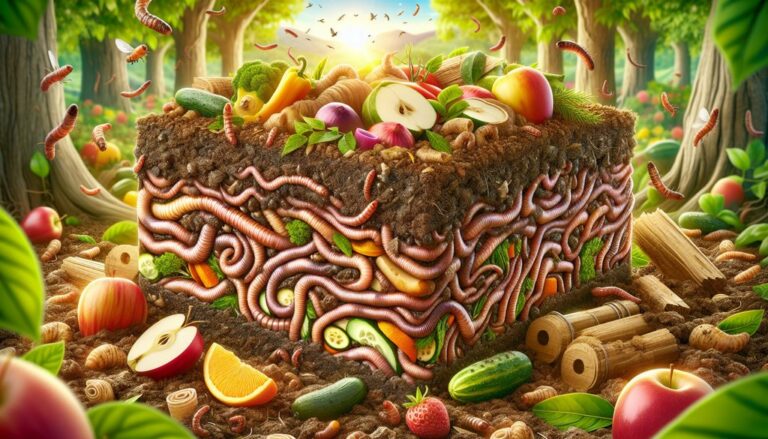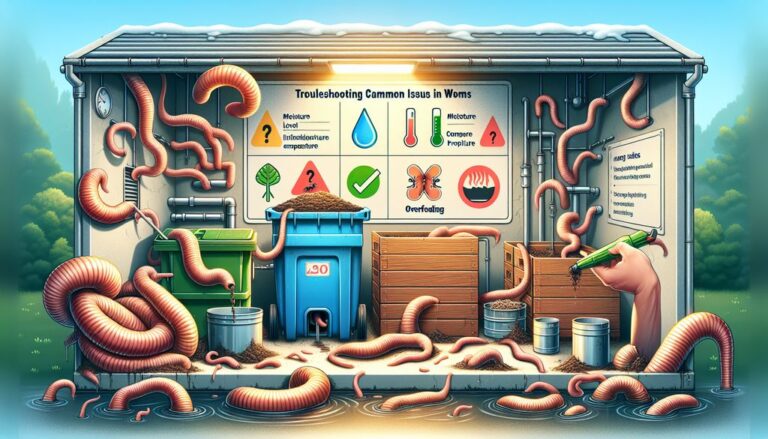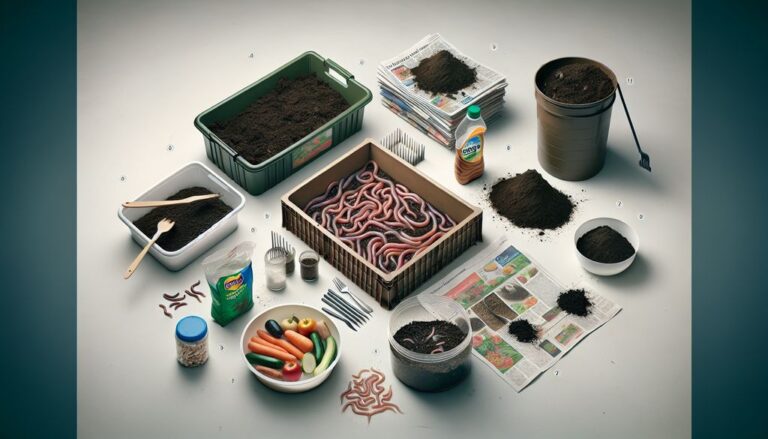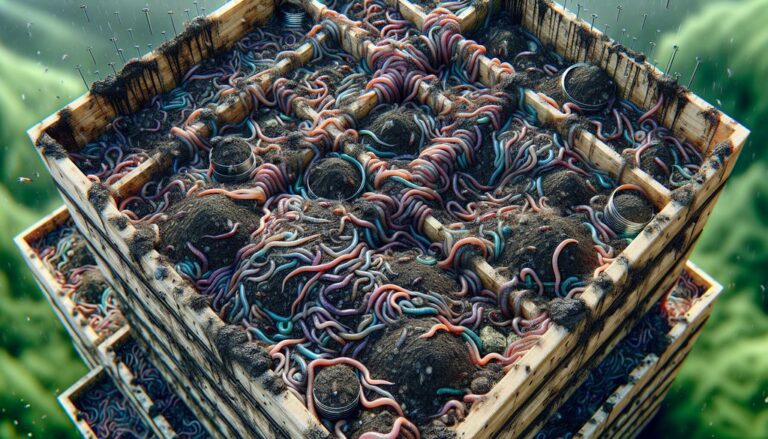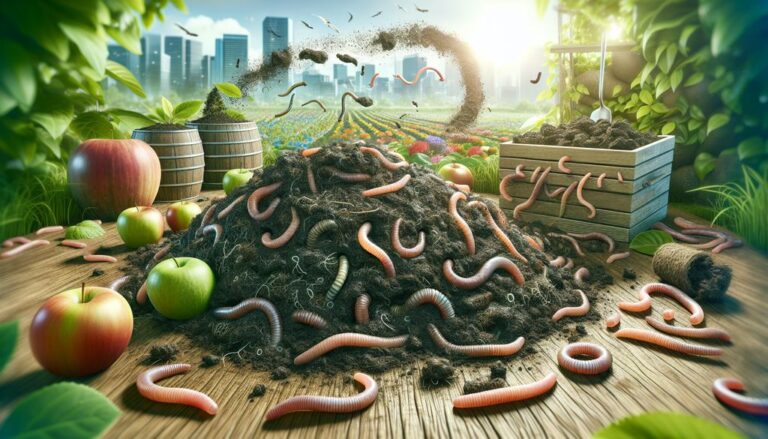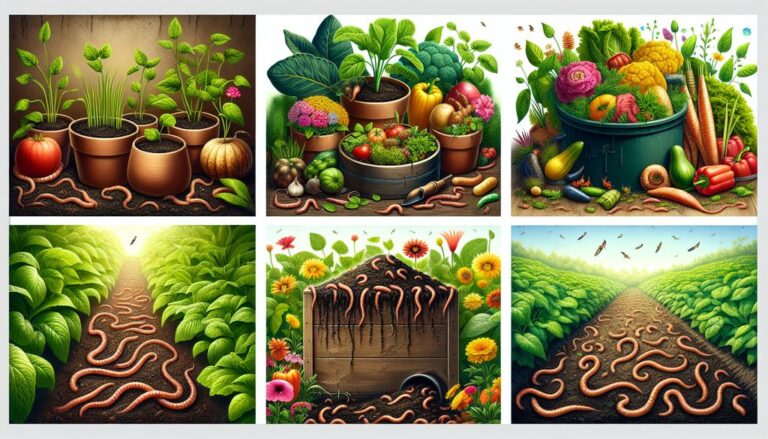Vermiculture, the practice of using worms to compost organic waste, is a sustainable and eco-friendly method of waste disposal and soil enrichment. As the seasons change, so do the challenges and opportunities in vermiculture. From adapting to spring’s new growth to managing summer pests and implementing winter strategies, seasonal changes play a crucial role in the success of a worm farm. In this article, we will explore how to adapt your worm farm through the seasons and optimize its impact on soil fertility and plant growth.
Key Takeaways
- Understanding seasonal changes is essential for successful vermiculture throughout the year.
- Eco-friendly waste disposal practices in vermiculture include recycling garden waste and implementing community composting programs.
- Enhancing soil fertility through composting and green mulching contributes to biodiversity and wildlife habitats.
- Optimizing plant growth with vermiculture involves monthly soil enrichment practices and the implementation of worm farming.
- Adapting to seasonal challenges and opportunities is crucial for maintaining a healthy and productive worm farm.
Understanding Seasonal Changes in Vermiculture
Adapting to Spring
As the frost of winter melts away, spring emerges as a critical time for vermiculture. This season is about rejuvenation and preparation for the warmer months ahead. It’s essential to understand that the activity within your worm farm will start to increase as temperatures rise. Here are some steps to adapt your worm farm to spring:
- Inspect your worm bin: Check for any necessary repairs and ensure that the habitat is still conducive for your worms.
- Balance moisture levels: As rainfall increases, adjust the moisture in your worm bin to prevent over-saturation.
- Gradually increase feeding: As worms become more active, they’ll require more food. Start slowly to avoid overfeeding.
- Pest management: Be vigilant about pests that can harm your worms or plants. Implement eco-friendly solutions to keep them at bay.
In spring, it’s also a good time to harvest compost that has matured over winter. This nutrient-rich material can be used to give your garden an early boost, promoting lush growth as the season progresses.
Remember, the success of your worm farm through the seasons depends on your ability to adapt to the changing conditions. Embrace the seasonality of vermiculture and enjoy the rewards of a thriving garden.
Managing Summer Challenges
Summer brings a unique set of challenges to vermiculture, with high temperatures and dry conditions often leading to a need for increased attention to moisture levels and pest management. Ensuring adequate moisture is crucial as worms require a damp environment to thrive. A simple yet effective approach is to regularly check the moisture levels of your worm bins and add water when necessary. However, avoid overwatering as this can lead to anaerobic conditions that are harmful to worms.
- Regularly check and adjust moisture levels
- Provide shade to prevent overheating
- Monitor for pests and take eco-friendly measures to control them
In the heat of summer, it’s important to strike a balance between keeping your worm farm moist and avoiding waterlogging. Strategic placement of bins in shaded areas can prevent overheating, while natural pest control methods maintain a healthy ecosystem without the need for harmful chemicals.
Another summer challenge is the management of critters that can become pests. These pests may invade compost or harm young plants. Implementing a robust ecological plan can help resolve these issues sustainably. Remember, the goal is to create a thriving environment for your worms that also supports your gardening efforts throughout the season.
Strategies for Winter Vermiculture
Winter can pose unique challenges for vermiculture, but with the right strategies, your worm farm can thrive even in the colder months. Insulation is key to maintaining an active worm farm during winter. Wrapping your worm bin with insulating materials such as bubble wrap, old blankets, or foam can help keep the internal temperature stable. Additionally, consider moving the bin to a garage or basement where it’s less likely to freeze.
- Monitor moisture levels: Worms need a moist environment, but excess water can freeze, harming them. Check the moisture regularly and add dry bedding if necessary.
- Feed sparingly: Worms are less active in the cold, so reduce the amount of food waste you add to prevent overfeeding and potential odor issues.
- Check for pests: Cooler weather can drive pests to seek shelter in your worm bin. Regular inspections can help catch any unwanted guests early.
By implementing these simple steps, you can ensure that your worm farm remains productive throughout the winter, providing you with rich compost for the spring planting season.
Eco-Friendly Waste Disposal in Vermiculture
Recycling Garden Waste
An eco-friendly approach to managing garden waste not only keeps your garden tidy but also contributes to a healthier environment. Recycling garden waste is a simple yet effective method to reduce landfill contributions and greenhouse gas emissions.
Types of garden waste include:
- Green waste (lawn clippings, leaves, plant trimmings)
- Wood waste (branches, pruned offshoots)
- Soil and rubble (from construction or layout changes)
When left to decompose in landfills without proper oxygen, green waste emits methane, a potent greenhouse gas. By recycling, we can prevent this and turn waste into valuable compost.
Recycling garden waste can be as straightforward as composting at home or utilizing local green waste services. Composting not only disposes of waste responsibly but also enriches the soil, promoting a cycle of growth and sustainability in your garden.
Donation-Driven Gardening Drives
Donation-driven gardening drives are a creative and community-oriented way to handle garden waste. By participating in these drives, gardeners can donate surplus materials like flower pots or metallic scraps, which can be repurposed or used in artistic installations. This not only prevents waste from ending up in landfills but also enhances the aesthetic appeal of local areas.
Embracing donation-driven gardening drives is a step towards sustainable living. It’s about transforming waste into resources and inspiring others to join in the effort.
Raising awareness is crucial. Engage with friends, colleagues, and neighbors to spread the word about the benefits of these practices. Here are some steps to consider:
- Stay informed about local littering laws to ensure compliance.
- Design your garden with waste management in mind, such as integrating hidden bins.
- Encourage community participation in neighborhood cleanup campaigns.
- Showcase eco-initiatives in schools to educate and inspire the younger generation.
Every action taken to manage garden waste responsibly contributes to nature conservation, from reducing pollution to enhancing soil productivity. It’s a collective effort that starts with individual commitment and grows into a community-wide movement.
Implementing Community Composting Programs
Community composting programs are a cornerstone of sustainable waste management, transforming kitchen scraps and yard waste into valuable compost. Engaging with local community groups can amplify the impact of your vermiculture efforts and contribute to a greener environment. Here are some steps to get started:
- Partner with neighborhood associations to identify suitable locations for community compost bins.
- Work with local authorities to obtain compost bins at subsidized rates, making it more accessible for residents.
- Organize workshops and educational sessions to teach community members about the benefits of composting and proper techniques.
- Establish a schedule for maintenance and collection to ensure the composting site remains clean and functional.
By fostering a culture of collective composting, we not only reduce the strain on landfills but also enrich our soil, promoting healthier plant growth and a more vibrant ecosystem.
Remember, community composting is not just about waste reduction; it’s a step towards achieving zero-waste goals and nurturing a sense of environmental responsibility within the community. With each contribution to the compost pile, we’re building a more sustainable future.
Enhancing Soil Fertility in Vermiculture
The Role of Composting
Composting is a cornerstone of sustainable gardening and plays a pivotal role in enhancing soil fertility. It transforms organic waste into valuable nutrients for plants, creating a closed-loop system that benefits the environment. By composting kitchen scraps and garden waste, you not only reduce landfill contributions but also foster a rich, living soil ecosystem.
- Benefits of Composting:
- Reduces waste sent to landfills
- Creates nutrient-rich soil amendments
- Supports beneficial soil organisms
- Improves soil structure and aeration
- Helps retain soil moisture
Composting is not just about waste reduction; it’s a proactive step towards nurturing a vibrant garden ecosystem. By integrating composting into your vermiculture practices, you contribute to a healthier planet and a more productive garden.
Remember, composting is a process that requires balance. A mix of green (nitrogen-rich) and brown (carbon-rich) materials is essential for successful decomposition. Regularly turning your compost pile ensures adequate oxygen flow, which is crucial for the microbes that break down the waste. With patience and care, your compost will mature into a dark, crumbly substance that your plants will love.
Benefits of Green Mulching
Green mulching is a simple yet effective technique that can significantly enhance soil fertility. By applying shredded leaves or grass trimmings around plants, you create a protective layer that retains soil moisture and regulates temperature, which is crucial for plant health. This layer also suppresses weed growth, reducing the need for chemical herbicides.
Green mulching is not only beneficial for your plants but also for the environment. It recycles garden waste, turning it into valuable nutrition for your soil.
Here are some of the key benefits of green mulching:
- Improves soil structure by adding organic matter as it decomposes.
- Conserves water by reducing evaporation from the soil surface.
- Regulates soil temperature, keeping roots cooler in summer and warmer in winter.
- Encourages beneficial soil organisms, such as earthworms, which further enhance soil health.
Remember, the success of green mulching depends on using the right materials and applying them at the correct time. Start with a layer of about 2-3 inches and replenish as needed to maintain its effectiveness throughout the growing season.
Creating Wildlife Habitats for Biodiversity
Vermiculture not only enriches the soil but also plays a pivotal role in creating habitats that support local wildlife and biodiversity. By integrating native plant species into your garden, you encourage a variety of pollinators and other beneficial creatures to take residence, which is essential for a healthy ecosystem.
- Wood Wastes: Utilize larger pruned branches as shelters for birds or small mammals.
- Native Plants: Plant species like corn mint or wild garlic to attract and sustain local wildlife.
- Let Nature Be: Resist the urge to over-manage your garden, allowing nature to maintain its own balance.
Embracing a wildlife-friendly garden means understanding the life cycle of the natural world and making small changes that can have a significant impact on the survival of common bird species and other fauna.
Researching the preferences of local wildlife and endangered species can guide you in creating an optimal garden design. This not only supports the creatures themselves but also contributes to the overall health of the environment. Educational signage can further enhance the value of your garden by informing visitors about the importance of biodiversity and the specific role of each plant in supporting it.
Optimizing Plant Growth with Vermiculture
Implementing Worm Farming
Implementing worm farming is a sustainable way to manage organic waste and enhance soil fertility. Worms play a crucial role in breaking down waste and producing vermicompost, a nutrient-rich organic fertilizer that promotes healthy plant growth. To start your worm farm, follow these simple steps:
- Select the right species of worms, such as red wigglers (Eisenia fetida), which are efficient at composting.
- Prepare a suitable worm bin with proper ventilation and moisture control.
- Feed your worms with organic waste like fruit and vegetable scraps, avoiding meats and dairy.
- Maintain the bin by keeping it in a cool, shaded area during hot weather and insulating it during cold months.
Vermiculture not only recycles waste but also creates a product that enriches the soil and supports plant growth. It’s a win-win for the environment and your garden.
Remember to monitor the moisture level and pH of your worm bin to ensure a healthy environment for your worms. With patience and care, your worm farm will thrive, providing you with a continuous supply of vermicompost.
Building a Garden Incinerator
A garden incinerator can be a practical addition to your vermiculture setup, especially for managing woody plant debris. When designed and used responsibly, it can help prevent the spread of plant diseases by safely disposing of diseased tree trimmings and other organic waste that is not suitable for worm consumption.
Building a garden incinerator requires careful consideration of local environmental standards to ensure it operates within legal and ecological guidelines.
Here are some steps to consider when constructing a garden incinerator:
- Determine the appropriate size for your garden’s needs.
- Select a location that is safe and complies with local regulations.
- Use materials that can withstand high temperatures and are non-toxic when heated.
- Ensure proper ventilation to minimize smoke and particulate emissions.
- Regularly maintain and clean the incinerator to ensure its efficiency and safety.
Remember, while a garden incinerator can be useful, it should be used as part of a broader waste management strategy that prioritizes composting and vermiculture. This approach helps in reducing the environmental impact of garden waste and supports a sustainable gardening practice.
Monthly Soil Enrichment Practices
Monthly soil enrichment is a cornerstone of successful vermiculture, ensuring your plants have access to the nutrients they need for optimal growth. Worms play a pivotal role by increasing the humus in the soil and leaving behind nutrient-rich castings. Monthly top dressings with well-composted organic materials not only add structure to the soil but also conserve water and suppress weeds.
Compost, a key component in soil enrichment, contains fewer salts compared to commercial fertilizers, making it safer for plants. Homemade compost tea is an excellent alternative to weekly chemical sprays, offering a sustainable and plant-friendly option.
When applying fertilizers, it’s important to understand that both organic and inorganic types provide essential nutrients like nitrogen, phosphorus, and potassium. Here’s a simple guide to fertilizer application:
- Liquid Fertilizer: Water the soil well before applying to ensure better absorption. These can be sprayed on foliage or used as a soil drench.
- Granular and Pellet Fertilizer: Apply to the soil and water immediately to activate. Slow-release options are convenient for indoor containers.
- Manures, Compost, and Worm Castings: These should be well-aged or composted to avoid high salt content. Compost can be used as a top dressing or mixed into the soil, while worm castings provide a natural boost to plant health.
Remember to always follow the directions carefully when using any type of fertilizer to avoid overfeeding and potential damage to your plants.
Conclusion
In conclusion, seasonal vermicomposting is a dynamic and rewarding practice that requires adaptation and flexibility throughout the year. From managing pests and critters to understanding the role of seasonality in gardening practices, there are numerous eco-friendly strategies to explore. Implementing worm farming, green mulching, and community composting programs are just a few examples of sustainable approaches to enriching soil fertility and promoting robust plant growth. By embracing these practices, gardeners can contribute to local biodiversity, reduce landfill burden, and cultivate healthier, more resilient gardens. With the right knowledge and tools, vermicomposting can be a fulfilling and environmentally conscious journey for garden enthusiasts.
Frequently Asked Questions
How does seasonality affect vermiculture practices?
Seasonality plays a crucial role in vermiculture practices as different seasons bring unique challenges and opportunities for managing worm farms. Understanding the impact of seasonality helps in adapting vermiculture techniques to optimize worm activity and composting processes.
What are the eco-friendly waste disposal practices in vermiculture?
Eco-friendly waste disposal in vermiculture involves recycling garden waste, participating in donation-driven gardening drives, and implementing community composting programs. These practices contribute to sustainable waste management and environmental conservation.
How does composting enhance soil fertility in vermiculture?
Composting plays a vital role in enhancing soil fertility in vermiculture by providing organic nutrients to the soil, supporting microbial life, and promoting efficient nutrient uptake by plants. It also creates wildlife habitats for biodiversity.
What is the role of worm farming in optimizing plant growth?
Worm farming, or vermiculture, contributes to optimizing plant growth by enabling worms to consume organic wastes and generate nutrient-rich worm manure. This nutrient-rich manure enhances soil fertility and supports robust plant growth.
How can garden incinerators be used in vermiculture?
Garden incinerators can be used in vermiculture for disposing of woody plant debris, such as diseased tree trimmings, in an environmentally friendly manner. When designed appropriately, small incinerators serve as handy tools for limiting disease spread and managing garden waste.
What are the benefits of monthly soil enrichment practices in vermiculture?
Monthly soil enrichment practices in vermiculture contribute to adding structure to the soil, reducing water needs, controlling weed growth, and promoting healthy plant growth. These practices also help in managing nutrient levels and minimizing the use of commercial fertilizers.

